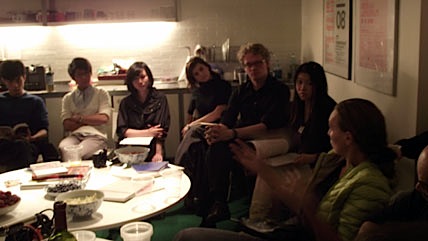|
About the Workshops
Concerning the idea of perpetual peace, Jeremy Bentham once wrote that "it is not only thought to be hopeless, but to such a degree that any proposal to that effect deserves the name of visionary and ridiculous." And yet, Bentham adds, "What better education [...] than the proposal itself?" Taking Bentham's provocation seriously, in these workshops we confronted a number of related questions concerning the idea of peace, for which there is no single answer or solution.
Can peace be defined only by the temporary cessation of hostilities, in a situation that implies the possibility of eternal war? Does the term hostility only refer to conflicts conducted by armies on behalf of nation-states, or can it also address the presence of conflicts in any area of social and political life (e.g., "religious wars," "culture wars," "the war between the sexes," "race wars," etc.) If the latter, then the 20th Century has seen the multiplication of hostilities and new social and political barriers to the idea of a permanent and lasting peace for all Humanity. Moreover, if peace only defines a relatively finite state, whether understood temporally or geopolitically, one which can only be enjoyed by relatively few at any given moment, can we accept this situation of scarcity as the answer to the question of perpetual peace? That is, is it acceptable that peace be reserved for those fortunate enough to live in a time of peace or within a peaceful province, while the rest of Humanity suffers from war and devastation?
Other Workshops

Watch videos created by students from Central Academy of Fine Art in Beijing, China about what peace means to them.
Acknowledgements
The recordings featured on this webpage are from workshops conducted at the Chinese University of Hong Kong and Asia Art Archive in November 2010 in Hong Kong, China. They were led by Aaron Levy, Executive Director of Slought Foundation; the aim of the workshops was to explore ideas of peace and social responsibility with reference to current conditions, within the framework of cultural dialogue and institutional exchange.
The programs were organized by Melissa Lam of the Chinese University of Hong Kong. Travel support provided by The Pew Center for Arts & Heritage through the Philadelphia Exhibitions Initiative, with additional support provided by the Society of Friends of the Slought Foundation.
Click here for information about other workshops
|
|
Listen to the Recordings
Multimedia Content Blocked
Chinese University of Hong Kong
Student discussion
(38 min)
Multimedia Content Blocked
Chinese University of Hong Kong
Faculty discussion
(25 min)
Multimedia Content Blocked
Asia Art Archive
Community discussion
(34 min)
Selected Quotations
- "Is the state of peacefulness a natural construct? Is it like hunger, for an example, an inborn thing? If not when do we start to feel peaceful or not peaceful? When do we draw this kind of relation?"
- "Peace is not about imposing your values on people. Conflicts always come in that way."
- "If we really use the word that we use in modern China, harmony rather than peace, well it could be very repressive in other contexts."
- "I think people in Hong Kong are very 'hai he'; they will internalise the discriminations, they are not outspoken like the Americans. Although internally they are probably equally critical of discrimination and they will distance themselves from people that they do not endorse, they will not openly criticize them."
- "Peace is like, for example if it is a color, bright red will be the passion, the color for happiness. But for peace it's more like a white color, that is more subtle and stable."
- "I have a problem with fighting for peace. To me peace is serenity, peace is being open to other people's ideas and being able to feel at one with it."
- "It seems ultimately that peace is to accept that there are conflicts in nature."
- "Peace is inclusiveness. Also peace is something related to human dignity, sharing of power."
- "Business can be a very good pacifier."
- "I wonder if peace cannot be compared to equilibrium, because it can never be constant."
- "If I understand my personal condition and if I am able to extend it so that I can be able to understand the status or the conditions of other people then I can get back this peace."
- "How can we stay still--harmonized or happy in our bubble--when things are non-stop changing around us?"
- "Its a mistake to replace peace with happiness."
|


